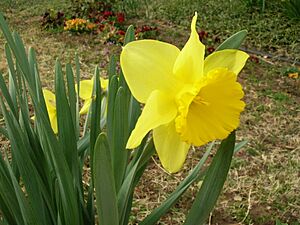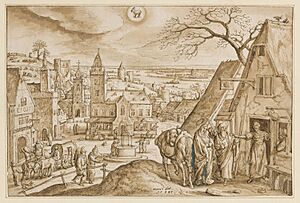December facts for kids
December is the twelfth and final month of the year. It has 31 days. It is part of the Julian and Gregorian calendars.
December gets its name from the Latin word decem, which means "ten". This is because it was originally the tenth month in the old Roman calendar around 750 BC. That calendar started in March. The cold winter days after December weren't part of any month. Later, the months of January and February were added to the beginning of the year. But December kept its original name.
In Ancient Rome, December was a time for many festivals. For example, on December 11, there was a day to honor Sol Indiges, a sun god. Saturnalia, a big festival, was held from December 17 to 23. These dates were different from our modern calendar.
The Anglo-Saxons called the period of December and January "Yule month" (Ġēolamonaþ). The French Republican Calendar also had parts of December within its months of Frimaire and Nivôse.
Contents
Astronomy
December includes the winter solstice in the Northern Hemisphere. This is the shortest day of the year, meaning it has the fewest hours of daylight. In the Southern Hemisphere, December has the summer solstice. This is the longest day of the year with the most daylight hours. (This doesn't include the very cold polar regions.)
So, December in the Northern Hemisphere feels like summer in the Southern Hemisphere. The start of astronomical winter in the Northern Hemisphere is usually December 21, or the date of the solstice.
Many meteor showers happen in December. Some well-known ones include the Geminids, which peak around December 13–14. The Ursids also peak around December 22.
Astrology
The zodiac signs for December are Sagittarius (until December 21) and Capricorn (from December 22 onward).
Symbols

December's birth flower is the narcissus. Its birthstones are turquoise, zircon, and tanzanite.



Observances
Many special days and holidays are celebrated in December around the world. Here are some of them:
Month-long Observances
- In the Catholic tradition, December often marks the start of Advent. This is a time of preparation for Christmas.
- It is also a month devoted to the Immaculate Conception.
Movable Observances
These dates change each year.
- Giving Tuesday (United States): This day for giving to charity happens right after Thanksgiving. It can be in late November or early December.
- Winter Solstice (Northern Hemisphere): This is the shortest day of the year. Many cultures celebrate it.
- Boxing Day (Commonwealth of Nations): Celebrated on December 26, often a day for shopping or sports.
Fixed Observances
These dates are the same every year.
- December 1
- World AIDS Day: A day to raise awareness about HIV/AIDS.
- Great Union Day (Romania): Celebrates the unification of Romania.
- Military Abolition Day (Costa Rica): Celebrates Costa Rica's decision to abolish its army.
- December 2
- International Day for the Abolition of Slavery: A day to remember the fight against slavery.
- December 3
- United Nations' International Day of Persons with Disabilities: Promotes understanding of disability issues.
- December 6
- Independence Day of Finland: Celebrates Finland's independence.
- St Nicholas Day (Western Christianity): Celebrates Saint Nicholas, who inspired Santa Claus.
- December 7
- International Civil Aviation Day: Highlights the importance of air travel.
- National Pearl Harbor Remembrance Day (United States): Remembers those who died in the attack on Pearl Harbor.
- December 8
- Feast of the Immaculate Conception: A Christian holiday.
- December 10
- Human Rights Day: Celebrates the Universal Declaration of Human Rights.
- December 12
- Jamhuri Day (Kenya): Celebrates Kenya becoming a republic.
- December 13
- Saint Lucy's Day: Celebrated in Scandinavia and parts of Italy with light and song.
- December 14
- Monkey Day: An unofficial day to celebrate monkeys and other primates.
- December 15
- Bill of Rights Day (United States): Celebrates the first ten amendments to the U.S. Constitution.
- December 16
- Day of Reconciliation (South Africa): Promotes national unity.
- December 17
- Wright Brothers Day (United States): Celebrates the first successful flight by the Wright brothers.
- December 18
- International Migrants Day: Recognizes the contributions of migrants worldwide.
- December 20
- International Human Solidarity Day: Promotes unity and cooperation.
- December 21
- First day of winter (in some cultures).
- December 22
- National Mathematics Day (India): Celebrates the birthday of mathematician Srinivasa Ramanujan.
- December 23
- The Emperor's Birthday (Japan): A national holiday in Japan.
- Festivus: A secular holiday celebrated by some as an alternative to Christmas.
- December 24
- Christmas Eve: The evening before Christmas Day.
- December 25
- Christmas (Christianity): A major Christian holiday celebrating the birth of Jesus.
- Quaid-e-Azam's Day (Pakistan): Celebrates the birthday of Pakistan's founder, Muhammad Ali Jinnah.
- December 26
- Kwanzaa (African-American community, United States): A celebration of African-American culture, lasting until January 1.
- Saint Stephen's Day: A Christian holiday.
- December 30
- Rizal Day (Philippines): Commemorates the national hero José Rizal.
- December 31
- New Year's Eve: The last day of the year, celebrated worldwide.
See also
 In Spanish: Diciembre para niños
In Spanish: Diciembre para niños
- Historical anniversaries
 | Janet Taylor Pickett |
 | Synthia Saint James |
 | Howardena Pindell |
 | Faith Ringgold |



